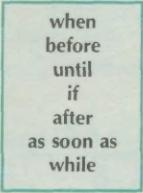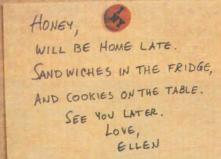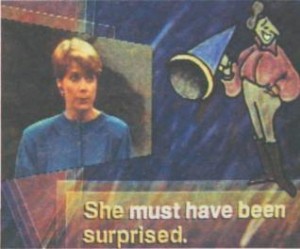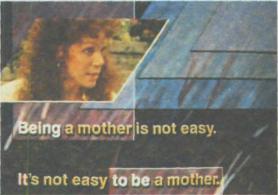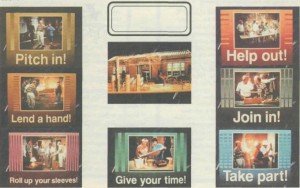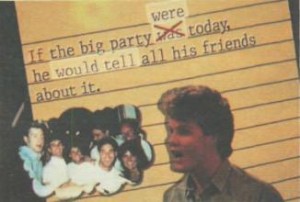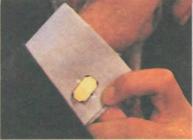Family Album USA 25 — Country Music
Смотреть онлайн в хорошем качестве курс английского языка — сериал Family Album USA 25 серия “Country Music” с английскими субтитрами, словарями и упражнениями:
In this episode, you will study . ..
VOCABULARY
camping
tent
flashlight
heaven
spirit
edge
surround
assure
GRAMMAR AND EXPRESSIONS
expressing present wishes
present tense with future meaning
expressing hopes about the future
expressing past «unreal» wishes and conditions
expressing past possibilities and impossibilities
U.S. LIFE
- Why do Americans like to go camping?
- What do people usually take with them on a camping trip?
- Where do people go camping?
YOUR TURN
- Do you enjoy outdoor activities?
- Have you ever gone on a camping trip?
Упражнения и Дефиниции к 25 серии Family Album USA:
Act 1

camping: outdoor living and recreation
mustard: a cold, thick yellow sauce made from spicy seeds, often served on hot dogs
I wish I had one now. To express a present wish, use a past verb form (had).

Jones Beach: a popular beach on Long Island, about 20 miles east of New York City
ketchup: a cold, thick red sauce made from tomatoes, onions, and other spices, often served on hamburgers

patties: small, flat cakes of ground meat
before we leave. Use the present tense (leave, not will leave) to refer to the future after before.
sitter: baby-sitter

It’s no big deal. = It’s not very difficult.
teething: growing new teeth
I wish he felt better. Here is another example of a past verb form (felt) referring to a present wish.
overly: too or too much
until he falls asleep. Use the present tense [falls, not will fall) to refer to the future after until.
lap: the front part of a person sitting, from the waist to the knees
camping out: sleeping outdoors
bring: Here, the correct word is take. Some speakers use bring instead of take. Use bring to mean «to carry to.» Use take to mean «to carry away.»
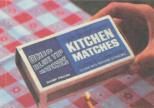
relish: a cold sauce made of olives, pickles, and other spicy foods
cooking utensils: tools used in a kitchen
audio diary. A diary is a record written each day of a person’s own experiences and thoughts. To keep an audio diary, a person uses a tape recorder instead of a book.
Activities
PRESENT TENSE WITH FUTURE MEANING
A. Marilyn and Richard will be away for the weekend, but Marilyn is worried about Max. She says, «I hope he’s good when we’re away.» Use the present tense to refer to the future after each of these words and phrases:

1. They will leave tomorrow morning, and they want to take some hamburgers along. Richard says, «I have to remember to put them in the bag tomorrow morning before we ______ (leave)»
2. Max keeps crying. He doesn’t want to sleep. Maybe he will fall asleep again. Richard says, «I’ll go upstairs and stay with him until he ______(fall) asleep again.»
3. Will Max miss his parents this weekend? Maybe there will be a problem with him. Ellen says, «We have a live-in doctor if there ______(be) a problem I can’t handle.»
B. You also use the present tense to refer to the future when a subject and verb follow the verb hope:
Complete each sentence below with the correct form of the verb in parentheses.
1. I hope Max ______(go) to sleep as soon as everyone ______(say) good-bye.
2. I hope Max _____(get) a lot of sleep while Richard and Marilyn _____ (be) on their trip.
Act 2
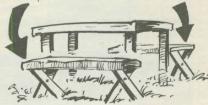
heaven: a state of great happiness
spirit: excited interest; enthusiasm
edge: the line where something begins or ends
spot: place or location
so far: until now
I wish we had brought Michelle. To express a wish about the past, use the past perfect tense (had brought).
in good hands: being taken care of well
surround: to be on all sides of
calming: causing a calm or quiet feeling
refreshing: causing a feeling of new energy; bringing back into good condition
I wish she were here. To refer to a present wish with the verb be, use were with all subjects.
soothing: causing a calm or quiet feeling
U.S. LIFE
Americans love to go camping. In the summer, American families and friends often spend their vacation at one of the beautiful campgrounds developed by the National Parks Service. Some Americans even spend weeks in the wilderness—undeveloped areas where no one lives. Many Americans enjoy sleeping in tents or staying in motor vehicles called campers or mobile homes.
Some Americans go camping to feel like the pioneers early settlers of the West for whom camping was a necessary way of life.
Organized camping for young people is an American tradition. Organizations, such as the Boy Scouts, Girl Scouts, and the Camp Fire Girls, offer opportunities for boys and girls to learn to survive outdoors. Getting «back to nature» is a popular reason for many activities in the U.S. today.
YOUR TURN
- Have you ever gone on a camping trip? If so, where did you go?
- Do you prefer outdoor or indoor activites?
Activities
«LET’S GO CAMPING»
Richard, Marilyn, Harry, and Susan are enjoying their camping trip. At the end of Act II, Marilyn gets an idea. What does she want to do? Circle the letter of the correct answer.
a. She wants to put some flowers in a bottle.
b. She wants to sleep while listening to some cassette tapes of beautiful music.
c. She wants to record the sounds of the country on a cassette tape.
d. She wants to stay awake all night.
WISH LIST
Use a past verb or auxiliary form to express a present wish. If the verb is 6e, use were (never was) with all subjects.
Here are three examples from Acts 1 and 2:
- Richard is thinking about a hot dog cooked outdoors over an open fire. He says, «I wish I had one now.» (But he doesn’t have one now.)
- Marilyn is thinking about Max. She says, «I wish he felt better.» (But he doesn’t feel better.)
- Susan is thinking about Michelle. She says, «I wish she were here with us to enjoy the country.» (But she isn’t here.)
The little cartoon character in this picture thinks he has a lot of problems. Read each of his thoughts. Then rewrite each sentence, using the word — /ish. Write the sentences on the lines below. The first answer is given.
Act 3
assure: to promise
take off: to leave quickly
The weather couldn’t have been better. = It wasn’t possible for the weather to be better. Use couldn’t have + a past participle to refer to past impossibilities.
It would have been great if we had been able to bottle the smells. To refer to an unreal condition in the past, use had + a past participle in the if clause (had been). In the main clause, use would have + a past participle (would have been). Here, Marilyn means that they were not able to put the smells in a bottle. Of course, she is just imagining when she says It would have been great.
a bit of a drive: a drive that is a little long
sleeping bag: a large cloth bag for sleeping in outdoors
overtired: very tired. When you are overtired, you sometimes can’t fall asleep even though you would like to sleep. You are almost too tired to sleep.
Activities
PAST «UNREAL» WISHES AND CONDITIONS
To express a wish about the past use the past perfect tense (had + past participle) in a that clause after the verb wish:
To refer to an unreal condition in the past, use the past perfect tense in an if clause. Use would have + a past participle in the main clause.
Complete each sentence below with the correct form of the verb in parentheses. One answer has a negative form.
1. Marilyn wishes she _____(take) Max camping.
2. If Marilyn _____ (take) Max camping, Ellen _____ (have) an easier weekend.
3. Ellen wishes she _____(stay) in the village a little longer.
4. If she _____(stay) in the village a little longer, she _____ (be) so tired.
5. Richard wishes he ______ (be) camping before this weekend.
6. If Richard ______(go) camping before, he _____ (know) what to do.
Note: In some cases, you may use might have, may have, or could have instead of would have (+ past participle).
PAST POSSIBILITIES AND IMPOSSIBILITIES
• If it’s possible that something happened, but you’re not sure, use might have, may have, or could have + a past participle:
Maybe she went home. = She might have gone home. = She may have gone home. = She could have gone home.
• If it’s possible that something didn’t happen, but you’re not sure, use might not have or may not have + a past participle.
Do not use a contraction for might not or may not:
Maybe she didn’t go home. = She might not have gone home. = She may not have gone home.
• If it’s impossible that something happened, use couldn’t have + a past participle:
It’s not possible that she went home. = She couldn’t have gone home.
Complete each of the following sentences with an auxiliary from the box below. Use the past participle of the verb in parentheses. For two of the items, more than one answer is possible.
1. The ground is completely dry this morning. It ________(rain) last night.
2. Please look in the car for the sleeping bag. I’m afraid that we _______ (remember) to take it.
3. Where is my sandwich? A bird _____ (eat) it.
